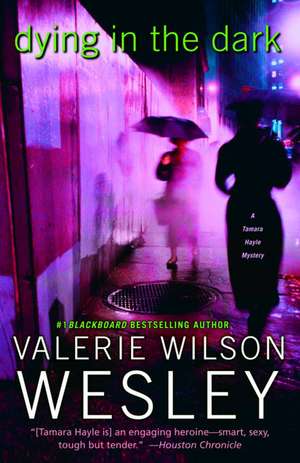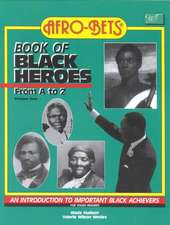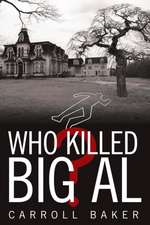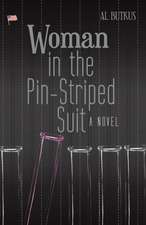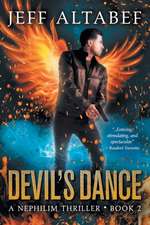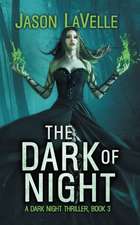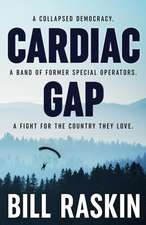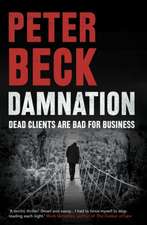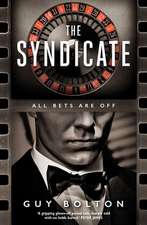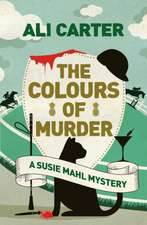Dying in the Dark: Tamara Hayle Mysteries
Autor Valerie Wilson Wesleyen Limba Engleză Paperback – 31 aug 2005
Tamara Hayle’s past has come back to haunt her–literally. She’s been plagued by terrifying dreams about Celia Jones, an old friend whose walk on the wild side led her to a horrible death. Celia’s teenage son, Cecil, begs Tamara to find his mother’s killer . . . only to end up dead himself, stabbed through the heart.
The search for Celia and her son’s killer pulls Tamara deep into her friend’s troubled love life, where everyone adored her but somebody held a murderous grudge. There’s her bullying thug of an ex-husband; a handsome ex-lover who woos Tamara with charm and lies; and an angry, jealous woman who claims that Celia broke her heart. And those were just the obvious people with axes to grind.
Despite her better judgment and the admonitions of the police department, Tamara refuses to back away from the mystery surrounding her old friend’s death and the tragedy that met her son. All clues lead to the past Tamara shared with Celia Jones, and Tamara fears that that past will threaten her own son. But she uncovers more than she bargained for–and unearths secrets someone would kill to keep in the shadows.
From the Hardcover edition.
Preț: 103.03 lei
Nou
Puncte Express: 155
Preț estimativ în valută:
19.71€ • 20.64$ • 16.31£
19.71€ • 20.64$ • 16.31£
Carte disponibilă
Livrare economică 15-29 martie
Preluare comenzi: 021 569.72.76
Specificații
ISBN-13: 9780345468079
ISBN-10: 0345468074
Pagini: 222
Dimensiuni: 133 x 204 x 13 mm
Greutate: 0.26 kg
Editura: ONE WORLD
Seria Tamara Hayle Mysteries
ISBN-10: 0345468074
Pagini: 222
Dimensiuni: 133 x 204 x 13 mm
Greutate: 0.26 kg
Editura: ONE WORLD
Seria Tamara Hayle Mysteries
Notă biografică
Valerie Wilson Wesley is the Blackboard bestselling author of six Tamara Hayle mysteries. Her recent novels include Always True to You in My Fashion and the novel Ain’t Nobody’s Business If I Do, for which she received the 2000 award for excellence in adult fiction from the Black Caucus of the American Library Association. A former executive editor at Essence magazine, she lives in New Jersey.
Visit the author’s Web site at www.tamarahayle.com
From the Hardcover edition.
Visit the author’s Web site at www.tamarahayle.com
From the Hardcover edition.
Extras
CHAPTER ONE
“Don’t never talk to haints,” my grandma used to tell me. “Haints” are what the old folks call ghosts, and when she’d say it, my daddy would roll his eyes and shake his head. But I knew what she was talking about. “If one comes knocking at your door, you just turn your head, look in the other direction, and never listen to what it has to say.” My grandmother has been dead since I was a kid, but her words still rang true even though Celia Jones wasn’t an ordinary “haint.” She wore green eye shadow, too much rouge, and enough Tabu cologne to make a preacher forget his calling, and the door she knocked on wasn’t the kind you walked through. She started showing up in my dreams about a month after she’d been murdered. For three nights straight.
Celia was the closest thing I had to a sister after Pet, my real one, pulled up stakes and split. The two of us would run the streets like wild things: sneaking out, bumming cigarettes and joints, sharing everything from drawers to dudes. We talked smart to men we had no business knowing and hung out places we had no business going. But I had my brother Johnny, may his soul rest in peace, to cool my heels and keep me out of trouble. He was always there when I needed him, even before he became a cop. After that, he’d warn any hardheaded Negro who looked my way to keep his eyes—and hands—off his baby sister.
Celia wasn’t so lucky. Her mama was dead, her papa didn’t give a damn, and her brothers and sisters were so glad to get out their daddy’s house, they steered clear of anything or anybody who reminded them where they came from. Celia was on her own, kicking ass and taking names all by herself. I loved her like she was kin because she was strong, smart, and knew her way around.
Over the years, I hadn’t thought too much about her until I saw the headline in the Star-Ledger: “Woman Shot, Killer Unknown.” It was the kind of story that caught my attention, since I make my living finding out who has done what to whom, and when I saw her name, I lost my breath. Celia had been shot full of holes on New Year’s Day in her ground-floor apartment in a dilapidated building off South Orange Avenue. I knew the place, and it made me sad to know she’d ended up there. She was identified as a waitress in a bar on Bergen, the kind of low-life dive you think twice about walking past in broad daylight. There were no suspects, the newspaper said, and no leads. And there were no follow-up stories. I looked every day.
I can’t say I shed any tears when I read it. We had known each other a long time ago and not parted as friends. We fought over a man, the dumbest thing in the world two women can fight over, so she’d gone her way and I’d gone mine. The last time I saw her, she was climbing into the driver’s seat of a midnight blue Lincoln. She had a Virginia Slims cigarette dangling out her mouth and a men’s T-shirt covering her high pregnant belly. I called her name, and when she turned in my direction, I saw a bruise the size of a silver dollar on the left side of her mouth. She looked straight through me. When we were kids, she used to say she’d kill any man who laid a hand on her, so I couldn’t believe what was on her face. I called her again and ran toward the car, and she pulled away from the curb so fast I had to jump out the way to keep from being hit.
“The hell with you, too, Celia Jones!” I screamed into the dust she left and that was that. In that instant I decided I didn’t want any part of any trouble she’d gotten herself into. My brother was dead, and I’d just married DeWayne Curtis, my son’s father. I was still young enough to think “true love” solved everything, and that that was what I had with DeWayne. I sure didn’t want somebody’s sorrow shadowing the happiness I’d found. So I let her and her pregnant self go wherever the hell she was going.
Maybe we still had unfinished “girlfriend” business. Maybe I should have searched for her, gone back to some of our spots, found a way to help her. Maybe that was why she came back to haunt me. But, then again, it could have been those ribs I’d bought at Costco’s and wolfed down like a fool two nights in a row. Pork will do that to you, if you’ve sworn it off like I had. Or maybe it was just seeing her name like I had in the paper and wondering who had taken her life so cruelly. It’s hard to say what brought Celia back, but I was pretty sure why she’d come.
The dream always started the same. I didn’t see her at first. All I saw were hands, calloused and ugly, squeezing deep into the hollow of her slender, brown throat. Her fingernails, with the bright red polish she always wore, were digging into the hands, trying hard to pull them from around her neck. Then I saw the locket I gave her when we graduated from high school. We bought lockets for each other the same day at Bamberger’s, the big department store that used to take up half of Market Street but that moved to the suburban malls in the early eighties. The one Celia gave me had a sapphire in the middle, cut glass no doubt. God knows what became of it. The one I gave her had a “ruby” because it was red, her favorite color. We’d both inscribed them with “From your best friend” on the top. In my dream, her locket was pulled tight around her neck, slashing her skin as her body arched. I could feel her choking, fighting for breath, for her life. That was when she looked at me, her green-shadowed eyes bright with fear, her shiny red mouth wide open. I could smell the Tabu.
“Help me!” she said.
I’d wake up then in a sweat, glad to be out of that place and in the safety of my own bedroom.
The first night I dreamed it, I jumped out of bed and ran to my son’s room to check on him. The second night, I went downstairs and made myself a pot of Sleepytime tea, then drifted off to sleep on the couch. The third night, I downed two shots of bourbon and wondered why the hell the girl was picking on me. Dreams are nothing but dreams, I reminded myself.
Or so they say.
Then they stopped, and after a night or two, I didn’t think about her anymore. After two weeks, I’d forgotten about the dreams altogether. I had other things on my mind, and on the top of my list was buying myself a new car. My dependable blue Jetta, aka the Blue Demon, may she rest in peace, had met a tragic end in a parking lot in Atlantic City, so I was taking cabs and public transportation until I could find a good deal on another one.
So when the kid knocked on my door that Monday morning, I was sitting at my desk, sipping coffee, and going through the used-car ads in the Star-Ledger. He came in before I could open it, slumping down in the chair in front of my desk like he had an appointment. It only took a minute to recognize him; his cheekbones and pretty slanted eyes were straight out of his mama.
“You Tamara Hayle?” He had a growl of a voice, too grown for such a skinny kid.
“You’re Celia’s boy, aren’t you?” He nodded and the shy little grin his mama used to pull when she needed to charm somebody spread out on his chapped lips. He was older than my son Jamal, but not by much. I knew he must be that baby she’d been carrying when I last saw her. He was dressed like a gangsta: loose, sloppy pants, bulky sweater, polished Timberland boots, a rolled-back stocking pulled over his soft wavy hair. Celia’s hair. A square-cut diamond ring in a platinum setting glittered on his right hand, which was far too big for his delicate fingers.
“Did you hear about my mama?”
“Yes. I’m so sorry. Do they know—”
The rage that came into his face was so intense it made me stop midsentence. Then his eyes watered so quickly I was sure he was going to cry, but he was too big for that. He balled his right hand into a fist and hit the palm of his left hand three times. If he hadn’t been a kid, I would have been scared of him. His eyes got hard, and he stared straight out my dirty office window to the buildings outside. When he shifted his gaze back to me, tears were still in his eyes, but he didn’t try to keep them back this time. My first impulse was to offer some comfort, but knowing teenage boys like I do, I knew that was the last thing he would want from somebody else’s mama. So I sat back and watched them roll down his hollow cheeks straight down to his just-grown beard.
“What’s your name?” I asked him.
“Cecil Jones.” He raised his chin in an odd show of defiance.
“Cecil Jones,” I repeated his name, wondering about the father whose name he didn’t carry. “What can I do for you today?” I asked, but I knew what he wanted and that there wasn’t a damn thing I could do for him.
“I want you to find out who killed my mama.” There it was anyway.
“What have the police told you?” I asked the predictable question.
“Fuck the police.” He gave the predictable answer, colored with so much anger I was sorry I’d asked.
“What made you come to me?”
“My mama wrote your address down in her book, and it was open to the page with your name on it the day she died.”
“Why do you think that I would be able to do more than the police can?” He looked puzzled, then hurt, then he narrowed his eyes.
“How much you want?” he asked.
“It’s not about the money, it’s—”
“How much you want?” His voice grew louder, more demanding.
“Nothing,” I said in exasperation.
“You work for free?” He looked doubtful, suspicious.
“No, I have a sliding scale. I usually charge fifty to seventy-five dollars an hour plus expenses, depending on the job, but I’m not sure if I should take—”
“You knew my mama, right?” His eyes flashed with anger.
“Not for many years,” I said gently.
“You knew my mama, right?” He was a boy again, the tears back in his eyes.
“Yeah.”
“Why won’t you do it then?”
I paused for a moment, running through my options, trying to think of an excuse so I wouldn’t have to get involved. It’s usually wise to let the past stay in the past. But sometimes I’m not a wise woman, and something inside me told me I didn’t have a choice.
“Okay,” I said, giving in.
“Then how much you want?”
“Look, you’re a kid, so whatever you can manage is fine. If you don’t have the money now, I can bill you when you get grown or you can pay me whatever you can pay me.” He smiled a quick, confident grin, Celia’s grin when she beat me at poker.
“I got money.” He pulled an assortment of items out of his pocket: a box cutter, two felt pens, a beeper, a pack of chewing gum, a cell phone, a small plastic case, and a thick wad of bills held together by a rubber band. He peeled off four hundred dollars in twenties, counted them twice, then slammed them down on the desk between us. “That enough?” He shoved the rest of the money and his other things back into his pockets.
“Where did you get all that money?”
“Is that enough to start?”
“Yeah,” I said, picking up the money, worrying about where he got it, but knowing that there was no way in hell he would ever tell me. I sighed and put it back down on the table, then decided maybe I owed the kid the benefit of a doubt. “That’s enough to start.”
“When you going to start then?” he asked with a child’s impatience.
“We can start now, if you want to. But first, I need you to answer a few questions, and I want you to be as honest with me as you can, even though the answers might make you uncomfortable. When something like this happens, the smallest thing or answer to an embarrassing question is the very thing that will lead me to where I want to go, do you understand?”
He thought about it for a moment. “Okay.”
“I also want you to understand that at some point, I will probably have to involve the police. Are you okay with that?”
A longer pause. “Yeah.”
I took out a pad and pencil to jot down some notes.
“Do you have any idea why your mother wrote my name in her book?”
“Naw, all she wrote was Tamara Hayle, Hayle Investigative Services. I found the book in her room when I found her.”
A chill went through me as I put my pen down. “You found your mother’s body?”
“Yeah.” He spoke with no emotion, and I knew that he wasn’t able to feel it yet, and it would be a long time before he’d be able to, if he ever did. It had been taken me a decade to get over finding my brother, and I am still haunted by it. Some things never leave you.
“Was she afraid of anybody?”
A shadow crossed his face, and I knew without pushing it that she was, so I didn’t wait for an answer. “When did this person threaten her?”
His face turned to stone, and I could see that however tough this kid thought he was, his mama had been dealing with somebody bigger and badder, and he might still be scared of whoever it was.
“So you’re not sure who was threatening her?”
“No.”
“Do you know why she didn’t go to the police?”
“She did. She went a couple of times.” His voice cracked.
“So they didn’t do anything?”
“Naw. They didn’t do shit.”
I made a quick note to check with the cops about restraining orders placed by Celia against boyfriends, past or present.
“Was she dating anybody?”
The sound that came out of his mouth was somewhere between a grunt and a laugh. “Dating? My mama?”
I put it bluntly. “Did your mother have a man?”
He sighed, an old man’s sigh. “There was always dudes hanging around my mama,” he said. That had always been the case with Celia Jones. She was never without a man for long, not even as a teenager. Traveling with a pair and a spare she used to call it.
“What about your father?” His eyes widened, but I couldn’t tell what emotion was behind them. “Do you have any contact with him?”
He studied me for a long time before he answered me. “Yeah. Every now and then, my old man comes by.”
“And his name is?”
He paused for so long I wondered if he knew it. “Brent. That’s who my daddy is. Brent Liston.”
I tried to conceal my reaction, but couldn’t quite do it. I’d known Brent Liston in high school. He was the first of the “bad” boys Celia hung out with who actually ended up doing time in prison. He hadn’t been a bad kid then, but a troubled one with a temper that could turn mean at the drop of a dime. But he had been good-looking and charming in his own rough way. He’d ended up doing time in Rahway for shooting his cousin over a hundred bucks in a drunken game of blackjack. I’d heard he was out. I wondered if the kid knew his father’s history.
“Have you seen your father recently?”
He didn’t say anything.
“Had your mother?”
He shrugged.
“Do you know if they ever had a violent confrontation?” The way the kid’s face dropped told me that my question had come out of left field. I knew the murder had probably been committed by somebody Celia knew well, and a man who had just done some years for killing somebody over a card game was as likely a suspect as any. I wondered if the cops had talked to him yet.
“No. He never hit her.”
I waited a couple of beats before I asked the next one.
“Do you think he could have done this to your mama?”
“No. I know he definitely didn’t do it. I know that! He wouldn’t do nothing like that!”
I didn’t push it. That would come later.
“Who was she afraid of, Cecil?” He glanced down at his hands, not wanting to answer, so I asked again.
“I don’t know the names, I told you, dudes were always hanging around her.”
“And you don’t know which one was threatening her?”
“No.”
“But it wasn’t your father?” I went back to Brent Liston.
“I told you already. Naw, it wasn’t my father.” I thought about Jamal and his relationship with my ex-husband, DeWayne Curtis. Jamal could talk about his father like a dog, but if he heard anybody utter the slightest criticism, he was on them like white on rice. No matter what DeWayne did, he was still his father, and that counted for something.
“About the book you got my name from? Do you still have it?” There might be names I could follow up with, even Brent Liston’s number or address.
He pulled a book covered in red cloth out of an inside pocket and put it on my desk. I picked it up, glanced through it, then put it back down. “I’d like to keep it, okay?”
“It was my mama’s.”
“It will only be for a couple of days while I go through it, and then I’ll give it back.”
He looked doubtful. “Okay.”
His beeper went off, and he pulled it out, glanced at me, then at the beeper, then pulled out his cell phone, changed his mind about using it, and put it back in his pocket.
“Can we talk later on? I got an appointment.” He looked nervous, and I wondered exactly what kind of business this boy was in.
“Sure.” I pulled out my appointment book. “What about tomorrow, around this time.”
“Okay.”
“By the way, where do you live?”
“Sometimes I stay with my girlfriend over on Eighteenth Street. But you can reach me at one of these numbers if you need to talk to me.” He jotted down three numbers on the edge of the blotter on my desk. I stood up to shake his hand. He looked surprised, but when I smiled he returned it. Celia’s smile.
“I’ll ask around, see what I can find out. But don’t get your hopes up. I’m sure the cops are still trying to find out who killed your mother, and I really think you should talk to them again.”
“I’ll think about it,” he said.
“Everything will be okay, Cecil.” He nodded like he believed me.
After he left, I put his money and the book into a safe I had recently installed. It was then that I noticed the small case he’d left on the edge of my desk. I wasn’t surprised when I opened it to find Celia’s locket. The fact that she’d kept it for all these years brought tears to my eyes. I placed it in the safe with the money and the book, planning to give it back to Cecil when I saw him the next day.
But the next day came and went, as did the next, and when I hadn’t heard from him by Thursday, I called the first number he’d jotted down on the blotter.
“What you want with him?” The woman’s voice was rough and ugly.
“Who is this?” I asked her.
“What you want with him?”
“Just let me talk to him, please.”
The woman choked out a laugh that sounded like a croak and came from the back of her throat. “You better make yourself a date with St. Peter then. That boy was stabbed through his heart Monday night. He dead and gone, just like his slut of a mama,” she said.
From the Hardcover edition.
“Don’t never talk to haints,” my grandma used to tell me. “Haints” are what the old folks call ghosts, and when she’d say it, my daddy would roll his eyes and shake his head. But I knew what she was talking about. “If one comes knocking at your door, you just turn your head, look in the other direction, and never listen to what it has to say.” My grandmother has been dead since I was a kid, but her words still rang true even though Celia Jones wasn’t an ordinary “haint.” She wore green eye shadow, too much rouge, and enough Tabu cologne to make a preacher forget his calling, and the door she knocked on wasn’t the kind you walked through. She started showing up in my dreams about a month after she’d been murdered. For three nights straight.
Celia was the closest thing I had to a sister after Pet, my real one, pulled up stakes and split. The two of us would run the streets like wild things: sneaking out, bumming cigarettes and joints, sharing everything from drawers to dudes. We talked smart to men we had no business knowing and hung out places we had no business going. But I had my brother Johnny, may his soul rest in peace, to cool my heels and keep me out of trouble. He was always there when I needed him, even before he became a cop. After that, he’d warn any hardheaded Negro who looked my way to keep his eyes—and hands—off his baby sister.
Celia wasn’t so lucky. Her mama was dead, her papa didn’t give a damn, and her brothers and sisters were so glad to get out their daddy’s house, they steered clear of anything or anybody who reminded them where they came from. Celia was on her own, kicking ass and taking names all by herself. I loved her like she was kin because she was strong, smart, and knew her way around.
Over the years, I hadn’t thought too much about her until I saw the headline in the Star-Ledger: “Woman Shot, Killer Unknown.” It was the kind of story that caught my attention, since I make my living finding out who has done what to whom, and when I saw her name, I lost my breath. Celia had been shot full of holes on New Year’s Day in her ground-floor apartment in a dilapidated building off South Orange Avenue. I knew the place, and it made me sad to know she’d ended up there. She was identified as a waitress in a bar on Bergen, the kind of low-life dive you think twice about walking past in broad daylight. There were no suspects, the newspaper said, and no leads. And there were no follow-up stories. I looked every day.
I can’t say I shed any tears when I read it. We had known each other a long time ago and not parted as friends. We fought over a man, the dumbest thing in the world two women can fight over, so she’d gone her way and I’d gone mine. The last time I saw her, she was climbing into the driver’s seat of a midnight blue Lincoln. She had a Virginia Slims cigarette dangling out her mouth and a men’s T-shirt covering her high pregnant belly. I called her name, and when she turned in my direction, I saw a bruise the size of a silver dollar on the left side of her mouth. She looked straight through me. When we were kids, she used to say she’d kill any man who laid a hand on her, so I couldn’t believe what was on her face. I called her again and ran toward the car, and she pulled away from the curb so fast I had to jump out the way to keep from being hit.
“The hell with you, too, Celia Jones!” I screamed into the dust she left and that was that. In that instant I decided I didn’t want any part of any trouble she’d gotten herself into. My brother was dead, and I’d just married DeWayne Curtis, my son’s father. I was still young enough to think “true love” solved everything, and that that was what I had with DeWayne. I sure didn’t want somebody’s sorrow shadowing the happiness I’d found. So I let her and her pregnant self go wherever the hell she was going.
Maybe we still had unfinished “girlfriend” business. Maybe I should have searched for her, gone back to some of our spots, found a way to help her. Maybe that was why she came back to haunt me. But, then again, it could have been those ribs I’d bought at Costco’s and wolfed down like a fool two nights in a row. Pork will do that to you, if you’ve sworn it off like I had. Or maybe it was just seeing her name like I had in the paper and wondering who had taken her life so cruelly. It’s hard to say what brought Celia back, but I was pretty sure why she’d come.
The dream always started the same. I didn’t see her at first. All I saw were hands, calloused and ugly, squeezing deep into the hollow of her slender, brown throat. Her fingernails, with the bright red polish she always wore, were digging into the hands, trying hard to pull them from around her neck. Then I saw the locket I gave her when we graduated from high school. We bought lockets for each other the same day at Bamberger’s, the big department store that used to take up half of Market Street but that moved to the suburban malls in the early eighties. The one Celia gave me had a sapphire in the middle, cut glass no doubt. God knows what became of it. The one I gave her had a “ruby” because it was red, her favorite color. We’d both inscribed them with “From your best friend” on the top. In my dream, her locket was pulled tight around her neck, slashing her skin as her body arched. I could feel her choking, fighting for breath, for her life. That was when she looked at me, her green-shadowed eyes bright with fear, her shiny red mouth wide open. I could smell the Tabu.
“Help me!” she said.
I’d wake up then in a sweat, glad to be out of that place and in the safety of my own bedroom.
The first night I dreamed it, I jumped out of bed and ran to my son’s room to check on him. The second night, I went downstairs and made myself a pot of Sleepytime tea, then drifted off to sleep on the couch. The third night, I downed two shots of bourbon and wondered why the hell the girl was picking on me. Dreams are nothing but dreams, I reminded myself.
Or so they say.
Then they stopped, and after a night or two, I didn’t think about her anymore. After two weeks, I’d forgotten about the dreams altogether. I had other things on my mind, and on the top of my list was buying myself a new car. My dependable blue Jetta, aka the Blue Demon, may she rest in peace, had met a tragic end in a parking lot in Atlantic City, so I was taking cabs and public transportation until I could find a good deal on another one.
So when the kid knocked on my door that Monday morning, I was sitting at my desk, sipping coffee, and going through the used-car ads in the Star-Ledger. He came in before I could open it, slumping down in the chair in front of my desk like he had an appointment. It only took a minute to recognize him; his cheekbones and pretty slanted eyes were straight out of his mama.
“You Tamara Hayle?” He had a growl of a voice, too grown for such a skinny kid.
“You’re Celia’s boy, aren’t you?” He nodded and the shy little grin his mama used to pull when she needed to charm somebody spread out on his chapped lips. He was older than my son Jamal, but not by much. I knew he must be that baby she’d been carrying when I last saw her. He was dressed like a gangsta: loose, sloppy pants, bulky sweater, polished Timberland boots, a rolled-back stocking pulled over his soft wavy hair. Celia’s hair. A square-cut diamond ring in a platinum setting glittered on his right hand, which was far too big for his delicate fingers.
“Did you hear about my mama?”
“Yes. I’m so sorry. Do they know—”
The rage that came into his face was so intense it made me stop midsentence. Then his eyes watered so quickly I was sure he was going to cry, but he was too big for that. He balled his right hand into a fist and hit the palm of his left hand three times. If he hadn’t been a kid, I would have been scared of him. His eyes got hard, and he stared straight out my dirty office window to the buildings outside. When he shifted his gaze back to me, tears were still in his eyes, but he didn’t try to keep them back this time. My first impulse was to offer some comfort, but knowing teenage boys like I do, I knew that was the last thing he would want from somebody else’s mama. So I sat back and watched them roll down his hollow cheeks straight down to his just-grown beard.
“What’s your name?” I asked him.
“Cecil Jones.” He raised his chin in an odd show of defiance.
“Cecil Jones,” I repeated his name, wondering about the father whose name he didn’t carry. “What can I do for you today?” I asked, but I knew what he wanted and that there wasn’t a damn thing I could do for him.
“I want you to find out who killed my mama.” There it was anyway.
“What have the police told you?” I asked the predictable question.
“Fuck the police.” He gave the predictable answer, colored with so much anger I was sorry I’d asked.
“What made you come to me?”
“My mama wrote your address down in her book, and it was open to the page with your name on it the day she died.”
“Why do you think that I would be able to do more than the police can?” He looked puzzled, then hurt, then he narrowed his eyes.
“How much you want?” he asked.
“It’s not about the money, it’s—”
“How much you want?” His voice grew louder, more demanding.
“Nothing,” I said in exasperation.
“You work for free?” He looked doubtful, suspicious.
“No, I have a sliding scale. I usually charge fifty to seventy-five dollars an hour plus expenses, depending on the job, but I’m not sure if I should take—”
“You knew my mama, right?” His eyes flashed with anger.
“Not for many years,” I said gently.
“You knew my mama, right?” He was a boy again, the tears back in his eyes.
“Yeah.”
“Why won’t you do it then?”
I paused for a moment, running through my options, trying to think of an excuse so I wouldn’t have to get involved. It’s usually wise to let the past stay in the past. But sometimes I’m not a wise woman, and something inside me told me I didn’t have a choice.
“Okay,” I said, giving in.
“Then how much you want?”
“Look, you’re a kid, so whatever you can manage is fine. If you don’t have the money now, I can bill you when you get grown or you can pay me whatever you can pay me.” He smiled a quick, confident grin, Celia’s grin when she beat me at poker.
“I got money.” He pulled an assortment of items out of his pocket: a box cutter, two felt pens, a beeper, a pack of chewing gum, a cell phone, a small plastic case, and a thick wad of bills held together by a rubber band. He peeled off four hundred dollars in twenties, counted them twice, then slammed them down on the desk between us. “That enough?” He shoved the rest of the money and his other things back into his pockets.
“Where did you get all that money?”
“Is that enough to start?”
“Yeah,” I said, picking up the money, worrying about where he got it, but knowing that there was no way in hell he would ever tell me. I sighed and put it back down on the table, then decided maybe I owed the kid the benefit of a doubt. “That’s enough to start.”
“When you going to start then?” he asked with a child’s impatience.
“We can start now, if you want to. But first, I need you to answer a few questions, and I want you to be as honest with me as you can, even though the answers might make you uncomfortable. When something like this happens, the smallest thing or answer to an embarrassing question is the very thing that will lead me to where I want to go, do you understand?”
He thought about it for a moment. “Okay.”
“I also want you to understand that at some point, I will probably have to involve the police. Are you okay with that?”
A longer pause. “Yeah.”
I took out a pad and pencil to jot down some notes.
“Do you have any idea why your mother wrote my name in her book?”
“Naw, all she wrote was Tamara Hayle, Hayle Investigative Services. I found the book in her room when I found her.”
A chill went through me as I put my pen down. “You found your mother’s body?”
“Yeah.” He spoke with no emotion, and I knew that he wasn’t able to feel it yet, and it would be a long time before he’d be able to, if he ever did. It had been taken me a decade to get over finding my brother, and I am still haunted by it. Some things never leave you.
“Was she afraid of anybody?”
A shadow crossed his face, and I knew without pushing it that she was, so I didn’t wait for an answer. “When did this person threaten her?”
His face turned to stone, and I could see that however tough this kid thought he was, his mama had been dealing with somebody bigger and badder, and he might still be scared of whoever it was.
“So you’re not sure who was threatening her?”
“No.”
“Do you know why she didn’t go to the police?”
“She did. She went a couple of times.” His voice cracked.
“So they didn’t do anything?”
“Naw. They didn’t do shit.”
I made a quick note to check with the cops about restraining orders placed by Celia against boyfriends, past or present.
“Was she dating anybody?”
The sound that came out of his mouth was somewhere between a grunt and a laugh. “Dating? My mama?”
I put it bluntly. “Did your mother have a man?”
He sighed, an old man’s sigh. “There was always dudes hanging around my mama,” he said. That had always been the case with Celia Jones. She was never without a man for long, not even as a teenager. Traveling with a pair and a spare she used to call it.
“What about your father?” His eyes widened, but I couldn’t tell what emotion was behind them. “Do you have any contact with him?”
He studied me for a long time before he answered me. “Yeah. Every now and then, my old man comes by.”
“And his name is?”
He paused for so long I wondered if he knew it. “Brent. That’s who my daddy is. Brent Liston.”
I tried to conceal my reaction, but couldn’t quite do it. I’d known Brent Liston in high school. He was the first of the “bad” boys Celia hung out with who actually ended up doing time in prison. He hadn’t been a bad kid then, but a troubled one with a temper that could turn mean at the drop of a dime. But he had been good-looking and charming in his own rough way. He’d ended up doing time in Rahway for shooting his cousin over a hundred bucks in a drunken game of blackjack. I’d heard he was out. I wondered if the kid knew his father’s history.
“Have you seen your father recently?”
He didn’t say anything.
“Had your mother?”
He shrugged.
“Do you know if they ever had a violent confrontation?” The way the kid’s face dropped told me that my question had come out of left field. I knew the murder had probably been committed by somebody Celia knew well, and a man who had just done some years for killing somebody over a card game was as likely a suspect as any. I wondered if the cops had talked to him yet.
“No. He never hit her.”
I waited a couple of beats before I asked the next one.
“Do you think he could have done this to your mama?”
“No. I know he definitely didn’t do it. I know that! He wouldn’t do nothing like that!”
I didn’t push it. That would come later.
“Who was she afraid of, Cecil?” He glanced down at his hands, not wanting to answer, so I asked again.
“I don’t know the names, I told you, dudes were always hanging around her.”
“And you don’t know which one was threatening her?”
“No.”
“But it wasn’t your father?” I went back to Brent Liston.
“I told you already. Naw, it wasn’t my father.” I thought about Jamal and his relationship with my ex-husband, DeWayne Curtis. Jamal could talk about his father like a dog, but if he heard anybody utter the slightest criticism, he was on them like white on rice. No matter what DeWayne did, he was still his father, and that counted for something.
“About the book you got my name from? Do you still have it?” There might be names I could follow up with, even Brent Liston’s number or address.
He pulled a book covered in red cloth out of an inside pocket and put it on my desk. I picked it up, glanced through it, then put it back down. “I’d like to keep it, okay?”
“It was my mama’s.”
“It will only be for a couple of days while I go through it, and then I’ll give it back.”
He looked doubtful. “Okay.”
His beeper went off, and he pulled it out, glanced at me, then at the beeper, then pulled out his cell phone, changed his mind about using it, and put it back in his pocket.
“Can we talk later on? I got an appointment.” He looked nervous, and I wondered exactly what kind of business this boy was in.
“Sure.” I pulled out my appointment book. “What about tomorrow, around this time.”
“Okay.”
“By the way, where do you live?”
“Sometimes I stay with my girlfriend over on Eighteenth Street. But you can reach me at one of these numbers if you need to talk to me.” He jotted down three numbers on the edge of the blotter on my desk. I stood up to shake his hand. He looked surprised, but when I smiled he returned it. Celia’s smile.
“I’ll ask around, see what I can find out. But don’t get your hopes up. I’m sure the cops are still trying to find out who killed your mother, and I really think you should talk to them again.”
“I’ll think about it,” he said.
“Everything will be okay, Cecil.” He nodded like he believed me.
After he left, I put his money and the book into a safe I had recently installed. It was then that I noticed the small case he’d left on the edge of my desk. I wasn’t surprised when I opened it to find Celia’s locket. The fact that she’d kept it for all these years brought tears to my eyes. I placed it in the safe with the money and the book, planning to give it back to Cecil when I saw him the next day.
But the next day came and went, as did the next, and when I hadn’t heard from him by Thursday, I called the first number he’d jotted down on the blotter.
“What you want with him?” The woman’s voice was rough and ugly.
“Who is this?” I asked her.
“What you want with him?”
“Just let me talk to him, please.”
The woman choked out a laugh that sounded like a croak and came from the back of her throat. “You better make yourself a date with St. Peter then. That boy was stabbed through his heart Monday night. He dead and gone, just like his slut of a mama,” she said.
From the Hardcover edition.
Descriere
RSmart, sexy, tough but tenderS ("Houston Chronicle"), P.I. Tamara Hayle tackles her toughest case: finding the killer of a close friend and her son. By a #1 "Blackboard" bestselling author.
